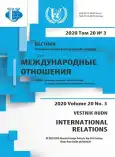Sanctions in U.S. - Russia Relations
- 作者: Ziegler C.E.1
-
隶属关系:
- University of Louisville
- 期: 卷 20, 编号 3 (2020): Russia’s Foreign Policy in the 21st Century: Views from Inside and Outside
- 页面: 504-520
- 栏目: THEMATIC DOSSIER
- URL: https://journal-vniispk.ru/2313-0660/article/view/320235
- DOI: https://doi.org/10.22363/2313-0660-2020-20-3-504-520
- ID: 320235
如何引用文章
全文:
详细
作者简介
Charles Ziegler
University of Louisville
Email: Charles.ziegler@louisville.edu
PhD in Political Science, Professor of Political Science and University Scholar, University of Louisville (Kentucky, USA), Faculty Director, Executive Director, Louisville Committee on Foreign Relations Louisville, USA
参考
- Baldwin, D. (1985). Economic Statecraft. Princeton: Princeton University Press
- Barry, C.M. & Kleinberg, K.B. (2015). Profiting from Sanctions: Economic Coercion and US Foreign Direct Investment in Third-Party States. International Organization, 69 (4), 881-912. DOI: 10.1017/ S002081831500017X
- Browder, B. (2015). Red Notice: A True Story of High Finance, Murder, and One Man’s Fight for Justice. New York: Simon and Schuster
- Chan, S. & Drury, A.C. (2000). Sanctions as Economic Statecraft: An Overview. In: Chan, S. & Drury, A.C. (Eds.). Sanctions as Economic Statecraft: Theory and Practice. Houndmills: Palgrave Macmillan. P. 1-16. doi: 10.1057/9780230596979_1
- Connolly, R. (2018). Russia’s Response to Sanctions: How Western Economic Statecraft Is Reshaping Political Economy in Russia. Cambridge: Cambridge University Press.
- Crawford, N. & Klotz, A. (Eds.). (1999). How Sanctions Work: Lessons from South Africa. New York: St. Martin’s Press.
- Drezner, D.W. (1999). The Sanctions Paradox: Economic Statecraft and International Relations. Cambridge: Cambridge University Press.
- Drezner, D.W. (2015). Targeted Sanctions in a World of Global Finance. International Interactions, 41, 755-764. doi: 10.1080/03050629.2015.1041297
- Early, B.R. (2015). Busted Sanctions: Explaining Why Economic Sanctions Fail. Stanford, CA: Stanford University Press.
- Firestone, T. & Contini, K. (2018). The Global Magnitsky Act. Criminal Law Forum, 29 (4), 617-628. doi: 10.1007/s10609-018-9353-z
- Gibbons, E.D. (1999). Sanctions in Haiti: Human Rights and Democracy under Assault. Westport, CT: Praeger.
- Gilligan, E. (2016). Smart Sanctions against Russia: Human Rights, Magnitsky and the Ukraine Crisis. Demokratizatsiya, 24 (2), 257-277.
- Gordon, J. (2011). Smart Sanctions Revisited. Ethics & International Affairs, 25 (3), 315-335. DOI: 10.1017/ S0892679411000323
- Gordon, J. (2012). Invisible War: The United States and the Iraq Sanctions. Cambridge: Harvard University Press
- Gould-Davies, N. (2020). Russia, the West and Sanctions. Survival, 61 (1), 7-28. DOI: 10.1080/ 00396338.2020.1715060
- Hufbauer, G., Schott, J.J., Kimberly, A.E. & Oegg, B. (2009). Economic Sanctions Reconsidered. 3rd edition. Washington, D.C.: Peterson Institute for International Economics
- Jentleson, B.W. (2000). Economic Sanctions and Post-Cold War Conflicts: Challenges for Theory and Policy. In: Stern, P.C. & Druckman, D. (Eds.). International Conflict Resolution after the Cold War. Washington, D.C.: National Academy Press. P. 123-171
- Kaplowitz, D.R. (1998). Anatomy of a Failed Embargo: U.S. Sanctions against Cuba. Boulder, CO: Lynne Rienner.
- Khudoley, K.K. (2019). Russia and the USA: Cool War Ahead? Teorija in Praksa, 56 (1), 98-117.
- LeoGrande, W.M. (2015). A Policy Long Past Its Expiration Date: US Economic Sanctions against Cuba. Social Research, 82 (4), 939-966.
- Marsh, K. & Lantis, J.A. (2018). Are All Foreign Policy Innovators Created Equal? The New Generation of Congressional Foreign Policy Entrepreneurship. Foreign Policy Analysis, 14 (2), 212-234. doi: 10.1093/fpa/orw030
- Martin, L.L. (1992). Coercive Cooperation: Explaining Multilateral Economic Sanctions. Princeton, NJ: Princeton University Press.
- Niblock, T. (2001). “Pariah States” and Sanctions in the Middle East: Iraq, Libya, Sudan. Boulder, CO: Lynne Rienner.
- O’Sullivan, M.L. (2003). Shrewd Sanctions: Statecraft and State Sponsors of Terrorism. Washington, D.C.: Brookings Institution Press.
- Pape, R.A. (1997). Why Sanctions Do Not Work. International Security, 22 (2), 90-136. doi: 10.2307/2539368
- Petrovsky, V. (2014). Russia and East Asia in the Context of the Ukrainian Crisis: ‘No’ to Sanctions, ‘Yes’ to a New World Order. International Affairs (Moscow), 60 (6), 88-99.
- Weiss, T.G. (1999). Sanctions as a Foreign Policy Tool: Weighing Humanitarian Impulses. Journal of Peace Research, 36 (5), 499-509.
- Zarate, J.C. (2009). Harnessing the Financial Furies: Smart Financial Power and National Security. The Washington Quarterly, 32 (4), 43-59. doi: 10.1080/01636600903235890
- Zarate, J.C. (2013). Treasury’s War: The Unleashing of a New Era of Financial Warfare. New York: PublicAffairs.
- Ziegler, C.E. (2018a). Russian Diplomacy: Challenging the West. Journal of Diplomacy, 19 (1), 74-90.
- Ziegler, C.E. (2018b). China - Russia Relations in Energy, Trade and Finance: Strategic Implications and Opportunities for U.S. Policy. In: Ellings, R.J. & Sutter, R. (Eds.). Axis of Authoritarians. Seattle, WA: National Bureau of Asian Research. P. 51-80
补充文件









